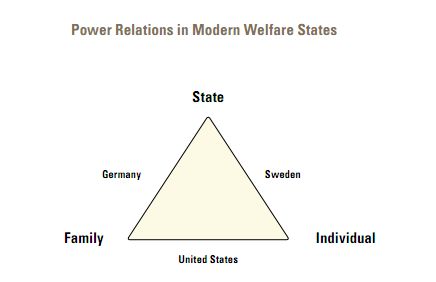
The diagramme above comes from an excellent report entitled “The Nordic Way” [PDF], produced by Swedish think tank Global Utmaning, and linked from this Bagehot piece about the Nordic countries. The paper itself is worth a read, although take it with a small pinch of salt as it presents a very rosy picture of the Nordic countries, at least economically. Having said that there’s nothing in the paper strikes me as intuitively wrong.
Further, the paper, and especially the diagramme above, set me thinking.
For years – indeed more or less for the life of this blog – I’ve been fascinated by the development of Nordic online politics. To me the vibrant online debate and blogging scenes in Nordic capitals are the strong counterbalance to the argument that the United States has the most advanced online politics in the world because it lacks a strong, trusted central government, and that it lacks trusted national traditional media – online politics has blossomed as a result of that. The Nordic countries have strong trusted governments, the highest newspaper readership in the world and a vibrant online politics. How come?
Does the answer perhaps lie somewhere else then, in the other point in the diagramme above, in the individualistic nature of Nordic societies? It’s summed up thus in the paper:
it is the combination of extreme individualism and a strong state that has shaped the fertile ground for an efficient market economy: Less tied down by legal, practical or moral obligations within families, individuals of both sexes become more flexible and available for productive work in a market economy
Could this also perhaps be at the root of why online politics has failed to take off in Germany to the same extent?
These are just rough thoughts for the moment, and I have not had the time to do the research to look at all the numbers. But I think there’s something more to this, and I’ll follow up more fully when I can.







